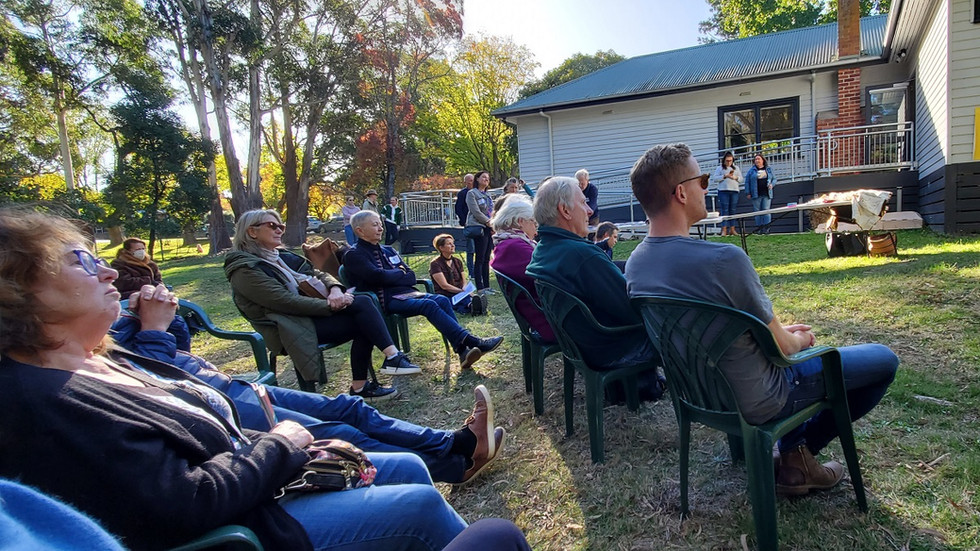Still on the job
- rosscolliver
- May 18, 2023
- 3 min read
Updated: May 29, 2023
We settler people have been around here since the 1830s.
When Auntie Karen welcomed us to Country at the launch a new landcare group in Macedon, I was reminded again that the first people have been here quite a bit longer. Her family goes back to William Barak, and she is from Barak's sister's line. Grandmothers down the line, all touched, she said, by Barak, family to her.
Barak was a person alive to his time. He did not turn away from the terrible dilemmas the arrival of Europeans had created for his people. Barak's father, Bebejan, and uncle, Billibellary, were Wurundjeri clan leaders, and his uncle was one of the leaders from the Kulin nation who signed off on John Batman's treaty in 1835. William Barak was at that signing ceremony, aged 11 years.
The arrival of the Europeans disrupted Barak's progression into initiation, and he grew up in European schools and the white man's religion. But this lack of traditional confirmation as a man didn't break his connection to family and to Country. He was a leader with responsibilities, and he pursued them vigorously, creatively.
A man of two worlds, Barak was a leading figure in creating Coranderrk in 1863, as a place of sanctuary and community. He kept on protecting it right into his old age. He died in 1903. From the 1890s, portions of Coranderrk were carved off the holding, acres leased to white farmers. It closed finally in 1924.
The Coranderrk community
And here we are, in 2023, on a surprisingly sunny afternoon, with one of his family, sitting in the back yard of the Neigbourhood House in Macedon, at the launch of the Macedon and Mount Macedon Landcare Group.
Auntie Karen is doing the Welcome to Country. She tells us where she comes from, people and place, as is her people's way. She has been doing the research, I hear her say later, getting it clear, so that when she speaks at an event like this, she can give us the proper connections. She tells us that Mt Macedon, this range of mountains behind us, was understood as one of the places where the waters begin.
There was a lot on the agenda that afternoon. We had the Mayor and Deputy Mayor, and a quick history of the last 4 billion years geologically, and Kate Lawrence from the Committee gave us a quick scan of waterways in the Macedon Ranges. Then Simon Purves from the Shire on the waterways reserves he works on two days a week.
I looked around at us, sitting there on two gentle curves of plastic chairs in the now lowering afternoon sun. We settlers are heirs to the wealth of this land. The people who once looked after it were driven off, and the institutions that were the means of dispossession still rule our relationship with the land - property, title, plus what you can get away with despite the law.
But we are heirs too to the honourable responsibility to care for Country. William Barak pursued his responsibilities through the corridors of the Victorian Parliament, following each twist and turn of the politics, being bold.
In 1874 when Coranderrk was under threat, Barak marched with the community to Parliament. In 1881, when there were again credible reports that Coranderrk was to be closed and the land taken over by neighbouring farmers, Barak rallied the settlement's 22 able-bodied men, and they walked to Spring Street to call for autonomy in the running of Coranderrk. Which they won.
22 able-bodied men, of all those people displaced by settlement and the closure of other reserves. And we environmentalists complain about being thin on the ground, and about the bureaucracy we that entangles our projects!
None of us knows what will happen to this way of life we have built around us, so much more expensive to maintain than the lifestyles of the First People. The times will get very difficult, some say.
There's certainly plenty to be done, but also a lot to enjoyed - creeks that still flow, sunshine on an autumn day, and the company of like-minded people, doing their bit to look after Country.
I feel a little nervous talking about Country, but I take my direction from Tyson Yunkaporta, in Sand Talk, who says that if you live on this country, then you can be a Countryman. You just have to take a look around and pick up your responsibilities.
Keep going, act boldly, is what I took from Auntie Karen that afternoon. It's a good to connect to a family which has seen a lot of changes, and is still on the job.
Ross Colliver, Riddells Creek Landcare
Barringo Creek, with its gauging station










Comments